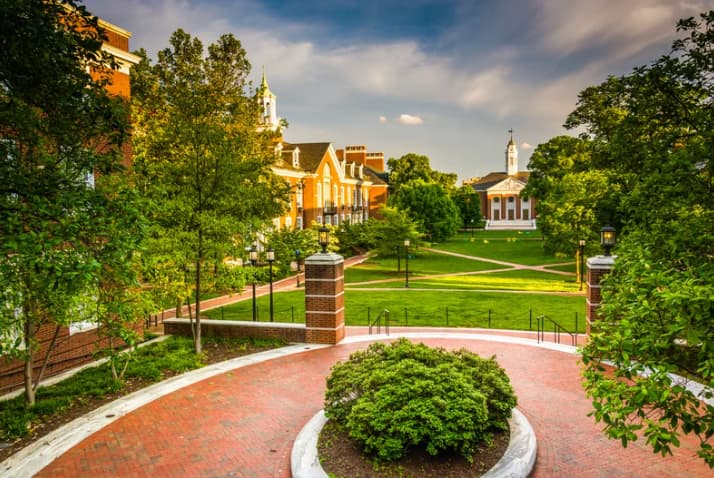
Johns Hopkins University requires applicants to respond to a single supplemental essay prompt, with a maximum limit of 350 words.
Required Prompt (Maximum 350 words)
Over the past 150 years, every monumental discovery at Hopkins has started with a first step: The first draft by a Pulitzer Prize-winning author. A prototype that led to a life-changing medical invention. The first pitch that launched a new startup venture. As we commemorate the university’s sesquicentennial—150 years since its founding—we continue to celebrate first steps just as much as final achievements. Tell us about an important first in your life—big or small—that has shaped you.
My first true experiment was a failure. In chemistry class, we were tasked with a simple synthesis reaction that was supposed to yield a vibrant blue copper sulfate crystal. I followed the procedure meticulously, measuring each component with precision. Yet, instead of a brilliant blue, my beaker held a murky, disappointing brown sludge. My first instinct was frustration; I had followed the steps, so the experiment should have worked. I spent an hour retracing my procedure, convinced I had made a simple error. The real “first step” occurred when I abandoned that assumption. Instead of asking “What did I do wrong?” I asked, “What if my materials were different?” This question launched my own independent investigation outside of the class assignment. I took a sample of our lab’s copper shavings and, using school equipment after hours, ran a series of tests. I discovered they were not pure copper but a cheaper alloy with a high zinc content, which reacted differently. The brown sludge wasn't a mistake; it was an answer to a question I hadn't thought to ask. That first failed experiment fundamentally shaped my scientific mindset. I learned that discovery doesn’t begin with finding the right answer, but with having the curiosity to investigate a wrong one. It taught me that every unexpected outcome is an invitation to question underlying assumptions. I am eager to bring this passion for rigorous, investigative problem-solving to the research-intensive environment at Hopkins, where every unexpected result is a first step toward a new discovery.
The first line of code I ever wrote for someone else was import pandas as pd. It wasn't for a class or a personal project, but for my town's free clinic, which was drowning in a sea of disorganized spreadsheets used to track patient appointments and supply inventory. The director, a kind but overwhelmed nurse, showed me the chaotic system, and my heart sank. I had only a basic knowledge of Python, but I saw a problem I had to at least try to solve. That first line, typed into a blank script, felt both terrifying and monumental. It was the start of a months-long process, not of complex coding, but of patient listening. I spent more time talking to the clinic's volunteer staff than I did writing code, learning about their workflow, their frustrations, and their needs. I scrapped my initial, overly ambitious ideas and focused on building a simple, intuitive tool they could actually use. The program I eventually delivered was not elegant, but it was functional. It worked for them. This experience was the first time I understood technology not as an abstract exercise, but as a tool for service. It shaped my belief that the most important part of engineering is not the technical solution, but the human problem it aims to solve. At Hopkins, I hope to continue this work, collaborating with peers at the intersection of public health and computer science to build technology that is not just powerful, but purposeful.
My first step into the world of history wasn't in a classroom, but in my neighbor’s living room. As part of a personal project to document the stories of my rapidly changing neighborhood, I sat across from Mr. Henderson, an eighty-year-old man who had lived on my street his entire life. I had a list of questions, but as I turned on my recorder, I realized my preparation was meaningless without his willingness to share. My most important first was not pressing the record button, but asking a simple, open-ended question—"What was the sound of this street when you were a boy?"—and then falling silent. In that silence, I learned to truly listen. He spoke of the rattle of the milkman’s truck and the shouts of children playing stickball, painting a vivid, auditory landscape that no textbook could ever capture. He didn't give me facts; he gave me feelings, memories, and a tangible sense of place. That first interview transformed my understanding of the past from a collection of dates and events into a rich tapestry of human experience. It shaped me into a historian of the small scale, someone who believes that the most profound discoveries are made by listening to the stories that are often overlooked. I want to bring this passion for qualitative, community-based research to Johns Hopkins, a place where I know the human element is central to every field of discovery.
For further inspiration, Johns Hopkins provides examples of successful essays on their "Essays That Worked" page.
All the best.